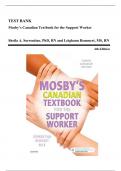Exam (elaborations)
Test Bank - Mosby’s Canadian Textbook for the Support Worker, 4th Edition (Sorrentino, 2018), Chapter 1-47 | All Chapters
- Course
- Institution
- Book
Test Bank - Mosby’s Canadian Textbook for the Support Worker, 4th Edition (Sorrentino, 2018), Chapter 1-47 | All Chapters
[Show more]



